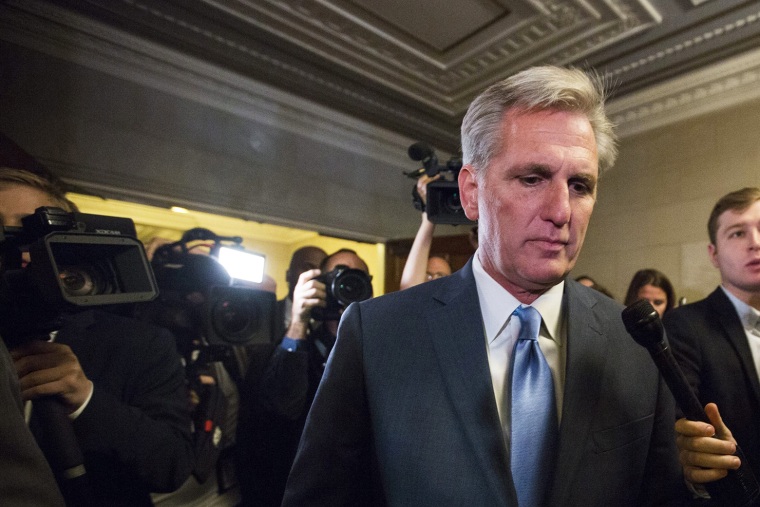House Minority Leader Kevin McCarthy (R-Calif.) has an interesting habit of making provocative comments when he thinks only friends are listening. In June 2016, for example, the California Republican told his fellow GOP leaders that he thought Donald Trump was on Russian President Vladimir Putin's payroll.
Republican officials initially insisted that McCarthy never made such a comment. Told that the Washington Post had a recording, the party switched gears and said McCarthy was kidding.
This week, it happened again, except this time the Washington Post obtained a recording of McCarthy telling donors what went wrong for his party in the 2018 midterms.
Speaking privately to his donors, House Minority Leader Kevin McCarthy squarely blamed Republican losses in last year's midterm elections on the GOP push to roll back health insurance protections for people with preexisting conditions -- and in turn blamed his party's right flank.McCarthy's comments, made in a Feb. 6 conference call from which The Washington Post obtained partial recordings, represent a vindication of Democratic efforts to elevate health care as an issue in last year's campaign. And in singling out the House Freedom Caucus, the remarks threaten to rekindle internal resentments inside the House Republican Conference.
"When we couldn't pass the repeal of Obamacare the first way through, an amendment came because the Freedom Caucus wouldn't vote for" the original House bill, McCarthy said. "That amendment put [the] pre-existing condition campaign against us, and so even people who are running for the very first time got attacked on that. And that was the defining issue and the most important issue in the race."
At face value, this looks like a simmering conflict between the top House GOP leader and his right-wing flank. Indeed, the Post spoke to Rep. Mark Meadows (R-N.C.), the Freedom Caucus chairman, who described McCarthy's behind-the-scenes comments as "very troublesome."
But just below the surface, there's a whole lot more going on here.
First, Republicans spent the better part of 2018 insisting that they didn't vote to strip Americans with pre-existing conditions of their ACA protections. In private, just last week, the top House Republican effectively admitted the opposite to his own donors.
Or put another way, they lied.
Second, I happen to think McCarthy's assessment is largely correct -- Republican efforts on health care were instrumental in helping House Democrats take back the chamber -- but it's also incomplete. The version of events he described comports with what actually transpired.
What McCarthy apparently neglected to mention, however, was his own complicity in the same scheme. It was the then-House majority leader who pressed his Republican colleagues -- including quite a few of his fellow Californians -- to support the regressive and unpopular legislation. Dems proceeded to use that vote as a cudgel, beating GOP incumbents and candidates with the bill for months.
McCarthy trying to hold the House Freedom Caucus responsible makes a degree of sense, but when the House minority leader is assigning blame, he may want to look in the mirror, too.
